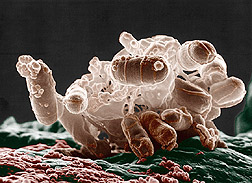New Way To Control E. Coli in Weaned Pigs |
|
 Colorized low-temperature electron micrograph of a cluster of E. coli bacteria. Individual bacteria in this photo are oblong and colored brown. As an alternative to using antibiotics for fighting E. coli infections in newborn and weaned pigs, scientists are finding promising results from introducing mixes of beneficial bacteria, obtained from other pigs, into the gut of young pigs. (K11077-2) |
The U.S. swine industry loses millions of dollars each year to bacterial infection in newborn and weaned pigs. In fact, Escherichia coli infection is the leading cause of sickness and death in these young animals. It causes colibacillosis—diarrhea, dehydration, weight loss, and inability to absorb electrolytes and nutrients. As an alternative to using antibiotics to control the illness caused by pathogenic E. coli infections, Roger B. Harvey is taking a new approach. A veterinary medical officer at the ARS Food and Feed Safety Research Laboratory in College Station, Texas, Harvey leads an effort to develop a defined, mixed culture of beneficial, or commensal, bacteria designated as RPCF—for recombined porcine continuous-flow. Scientists think that RPCF might one day be able to replace today's antibiotic treatments, which are coupled with ambient temperature regulation, better hygiene, and zinc oxide applications. Having an effective replacement available is especially important because of E. coli's growing resistance to antibiotics. Harvey's approach involves colonizing young pigs' intestinal tracts with a mixture of commensal bacteria, obtained from other pigs, that help establish a healthy gut flora much more quickly than would otherwise occur. These bacteria attach to intestinal walls, blocking sites so that disease-causing bacteria can't attach and compete for needed nutrients. Some of the colonizing bacteria also produce bactericidal compounds that work against pathogens, reducing their ability to colonize the intestinal tract. So far, about 35,000 pigs have been tested in four nursery farms and one wean-to-finish operation in five different U.S. regions. Pigs on these farms had previously been diagnosed with disease caused by the F-18 strain of E. coli. Researchers dosed piglets orally with RPCF within 24 hours of birth. Later, they collected data on weaning weights, weaning mortality, feed consumption and efficiency, average daily weight gain, and medication costs. "So far, things look really good," says Harvey. "The RPCF mixture of beneficial bacteria has been very promising. It's already been shown to reduce mortality, morbidity, and medication costs from E. coli, compared to untreated pigs." Though cost benefits to producers from mortality reductions varied, depending on the size of the farm, they averaged about $22,000 per farm in the first year of testing. Once marketed commercially, RPCF could one day give producers the viable alternative to antibiotics they need for protecting piglets against some disease-causing strains of E. coli. These findings were presented at the 9th annual International Symposium on Digestive Physiology in Pigs in Banff, Alberta, Canada, in May 2003. This research was funded in part by a grant (No. 02-196) from the National Pork Board, Des Moines, Iowa.—By Alfredo Flores, Agricultural Research Service Information Staff. This research is part of Food Safety, an ARS National Program (#108) described on the World Wide Web at www.nps.ars.usda.gov. Roger B. Harvey is with the USDA-ARS Southern Plains Agricultural Research Center, 2881 F & B Rd., College Station, TX 77845; phone (979) 260-9259, fax (979) 260-9332. "New Way To Control E. Coli in Weaned Pigs" was published in the March 2004 issue of Agricultural Research magazine.
|






